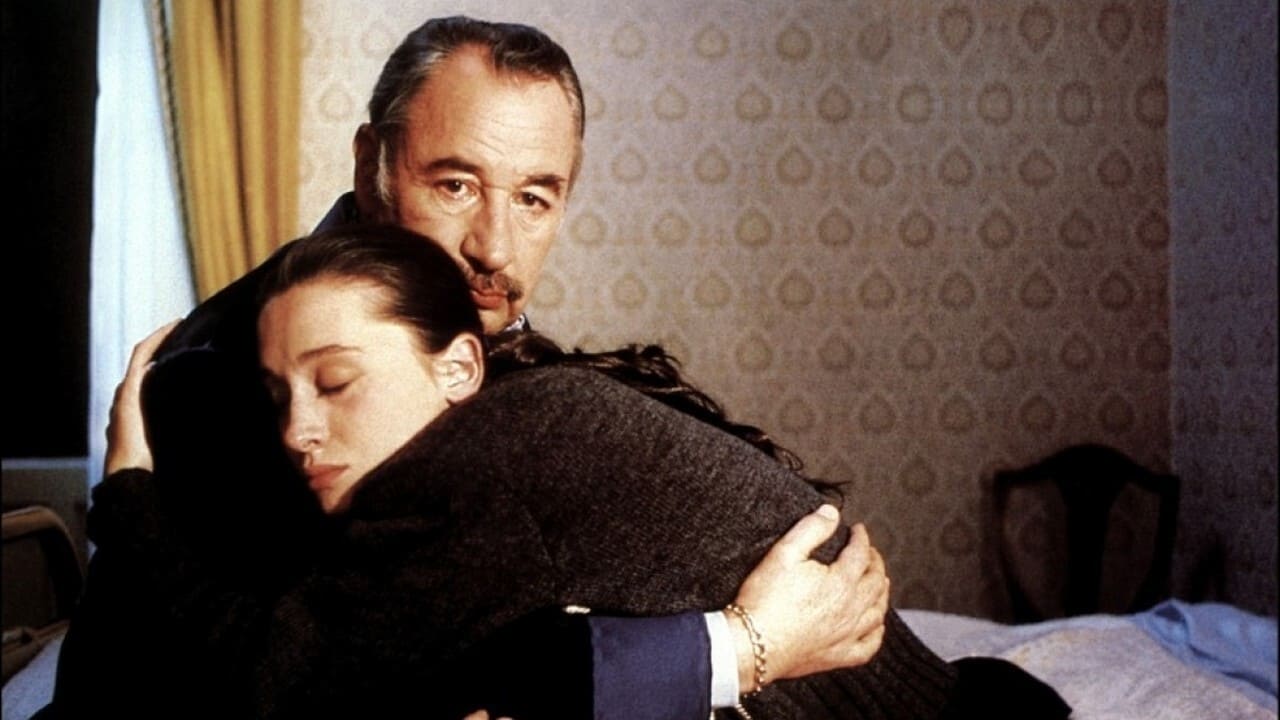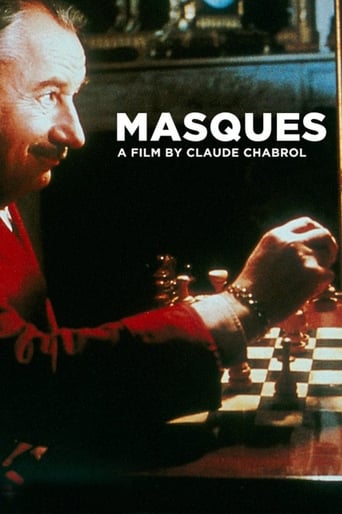Brightlyme
i know i wasted 90 mins of my life.
Freaktana
A Major Disappointment
Borgarkeri
A bit overrated, but still an amazing film
Kidskycom
It's funny watching the elements come together in this complicated scam. On one hand, the set-up isn't quite as complex as it seems, but there's an easy sense of fun in every exchange.
jotix100
The popular television presenter, Christian Legagneur, is a man loved by his millions of fans. He is famous for the prizes given in the program to older contestants who are rewarded with exotic trips to faraway places. As any celebrity worth his fame, Legagneur is flattered when Roland Wolf decides to write his biography. The emcee proposes to do it in his country estate.Nothing prepares Roland for what he is about to find in the château-like setting. There are some other guests who seem to be part of Legagneur's coterie of friends. But Roland in reality is in pursuit of someone who disappeared a long time ago. Finding Catherine, a mysterious young woman afflicted with a strange nervous disease at the estate poses a lot of questions Legagneur is not ready to answer."Masques" directed by Claude Chabrol was shown recently on cable as a retrospective of his work. The film was a collaboration between the director and Odile Barski, who contributed a lot to his work. The film plays like an English mystery. It is elegant, and nothing seems to be what it appears. There are things Legagneur did not want to reveal, much less have a snoop among his household.One good excuse to watch "Masques" is Philippe Noiret, who as Christian Legagneur, is sly, as well as amusing. This man, a product of the media, has secrets better left untold. His collaboration in his own biography backfires on him. Robin Renucci is fine as Roland. The great Bernadette Lafont, who worked with M. Chabrol in many films, adds a bit of fun to the proceedings. Lovely Anne Brochet has the most difficult part of Catherine."Masques" is mildly entertaining, but it is not in the same league of of of the best work of the great Claude Chabrol.
Terrell-4
With Claude Chabrol's Masques, we have mystery in the country manor with, perhaps, murder in the country manner. But was there a murder and, if so, who did the murdering? Chabrol leads us to the easy conclusion, reassures us, then let's us consider the thought that there might be other possibilities. It's far better for a director's reputation that he or she turn out turgid serious films than well- crafted entertainments. Claude Chabrol is a case in point. Although his more serious films are scarcely turgid, it is his many films over the last 35 years or so, most of which can easily be called entertainments, at least by me, that sometimes cause a condescending sniff. It's nearly impossible to read comments about a Chabrol film without seeing yet another reference to his "French New Wave" credentials -- of over 40 years ago -- or to that tired old cliché of Chabrol being France's answer to Hitchcock. I admire Chabrol for one simple reason. In a long career he has continued to make movie after movie, year after year, and good ones. While most of his peers have died, or took themselves too seriously, or wandered about, or didn't produce much, Chabrol has just kept busy making movies...all kinds of movies, mysteries, murders, comedies, satires, dramas. He can be serious about serious things, if it suits him, but more often he can be amusing about serious things. His movies are literate and nearly always depend upon the mood Chabrol creates around the plot. It's clear that he's not impressed by authority figures or the conventions of smooth-running society. He's not above a bit of gruesome shock. Occasionally he can be unsettling, even sad. Occasionally he'll produce a dud or a half dud. Through it all, he keeps making movies. It seems to me that if one accepts that motion pictures are above all popular entertainment, then having one's films praised as entertainment -- literate entertainment -- should be seen as high praise. Chabrol is one of the great craftsmen of movie making, one with a point of view, and one with whom some fine actors want to work. And that brings us back to Masques, another of Claude Chabrol's literate entertainments, this one with that great actor, Philippe Noiret. Christian Lagagneur (Noiret) is the ebullient host of a popular television game show. On a pink set with a ricky-tick band playing ricky-tick music, Lagagneur hosts elderly couples who must perform a song or a dance, and then they're voted upon to see which couple wins the trip of a lifetime. He agrees to have Roland Wolf (Robin Renucci) write his biography. He invites Wolf to a weekend at his country manor where they'll work together. At the manor are Lagagneur's secretary, Colette, a smiling, watchful woman, along with his live-in masseuse and her husband, who looks after the wine. The cook is also the chauffeur, a man who is mute. "Max had tongue cancer which metastasized into his ears," explains Lagagneur to Wolf. There also is Catherine, a pale, thin young woman who wears dark glasses in the house. Catherine is Lagagneur's ward and godchild. She is a minor but just barely. We know something's up when Wolf, unpacking in his room, removes a revolver from his valise and hides it away in a closet, and then discovers a lipstick. He looks at it carefully, and then writes a large M on the mirror. He murmurs "Madeleine" and then wipes it off. It's not long before we discover Madeline was a houseguest, too, who left suddenly in the night. We witness Lagagneur's solicitude for Catherine, his insistence that doctors not see her because of the damage they caused earlier, his concern that she take the pills Colette crushes and mixes in her tea. We also witness Catherine's instability, her mood swings and her unexpected passions. Wolf interviews Lagagneur, records everything, and at night discovers secrets. Whatever is going to happen in this manor house over the weekend, we can be sure death will be involved. Philippe Noiret dominates the movie just as his character, Christian Lagagneur, dominates the manor house and the game show. Lagagneur is relentlessly full of bon homme. His overwhelming small talk gives nothing away. His charm at first can seem genuine. Noiret, whether prancing about the television stage embracing an old woman dressed in her best, glancing at his cue cards and mouthing aggressive patter about the delights of old age, or playing chess in a dark room while measuring with drooping eye lids the possible motives of Wolf, is sheer pleasure. Noiret has played so many indelible characters it's impossible to say which are best. Among my favorites are Lucien Cordier in Coup de Torchon, Major Delaplane in Life and Nothing But, Alfredo in Cinema Paradiso and D'Artagnan in the amusing Revenge of the Musketeers. And if you like stick-it-in-your-nose detectives who must have paprika on their eggs, try Claude Chabrol's Inspector Lavardin in Cop au Vin and Inspecteur Lavardin. Masques is a clever, misleading mystery with some sharp edges.
dbdumonteil
The eighties were not that much a great time for Claude Chabrol.Most of the works of this era ,either have not worn very well (les fantômes du chapelier,poulet au vinaigre) or were not themes for him anyway (le cheval d'orgueil,Patricia Highsmith's "le cri du hibou") "Masques " is probably his best since "Violette Nozières" (1978) and nearly matches the brilliance of the late sixties/early seventies heyday.Completely unpretentious,it's full of humor,suspense and of course gastronomy (is there a Chabrol movie where they do not eat?).A marvelous spoof on these numerous TV shows which take dumbness to new limits, a detective story,this movie is much fun to watch. Philippe Noiret,overplaying as hell -and he's thoroughly enjoyable-,plays the emcee of a broadcast for old people who sing songs of long ago,("les roses blanches" ,the most maudlin song of the whole French repertoire,crooned by an old man, can be heard on the cast and credits).By no means a caricature, because, we've seen worse on French TV.And to crown it all,the host uses "HItchcock presents " music to enhance his horrible show.And that's not all!Philippe Noiret's character is Mister LEGAGNEUR (GO-GETTER) The emcee is so full of himself he asks a young novelist (Renucci) to write his biography.They are to work in the country in Legagneur's desirable property,complete with court and chef .A delightful gallery of weirdoes hangs around:A couple,Roger Dumas ,a wine connaisseur, and Bernadette Laffont,who enjoys reading someone's cards and less commendable things -to think that Laffont was featured in Chabrol's very first ,"le beau Serge" ,in 1958!-;a deaf and dumb chauffeur;two strange servants, one of them relishes with Charlotte Armstrong's detective stories-like Chabrol ,who adapted this writer twice :"la rupture" (1970)and "merci pour le chocolat" (2000)-;and,last but not least,a strange girl (Brochet), Legagneur's goddaughter(sic).She seems very sick,or maybe someone helps her to be sick? Actually nothing is what it seems .Everybody hides himself behind his mask,including the director ,who puts on his Chabrol mask this time.
jameswtravers
At a time when skeletons were being found in the cupboards of a number of well-known celebrities in France, Chabrol created this film which asks the simple question: what lies beneath the mask of an apparently pleasant and sugar-sweet public figure? Can such a person be utterly wicked, capable of fraud, deceit - even murder - and get away with all that unnoticed? How far can the public image and the private reality differ?For the subject of his analysis, Chabrol could hardly have chosen a better actor than Philippe Noiret. In his role, Noiret is so successful that it is virtually impossible to believe that his character could harm a fly - until the truly disturbing scene when his daughter shows him a bird in a cage, triggering a phobic reaction that causes the mask to slip - albeit for just a moment. After that, the mask stays firmly in place, until the last possible moment. But when the mask does fall, as it has to, and Legagneur turns on his television viewers, we see the truth in an instant and ask ourselves: how could we have been so blind? More disturbingly, we begin to question - as Chabrol intended we should - whether any real-life TV presenters have similar dark secrets.Whilst not quite in the league of some of Chabrol's other thrillers (most notably the superb La Cérémonie), Masques is a film which does have some gripping moments and some sparkling dialogue. The ending is as funny as it is tragic, and, as a thought-provoker, it achieves its objective a little too successfully. I for one will never be able to watch a silver-tongued TV presenter again without thinking: what lies behind this mask?

